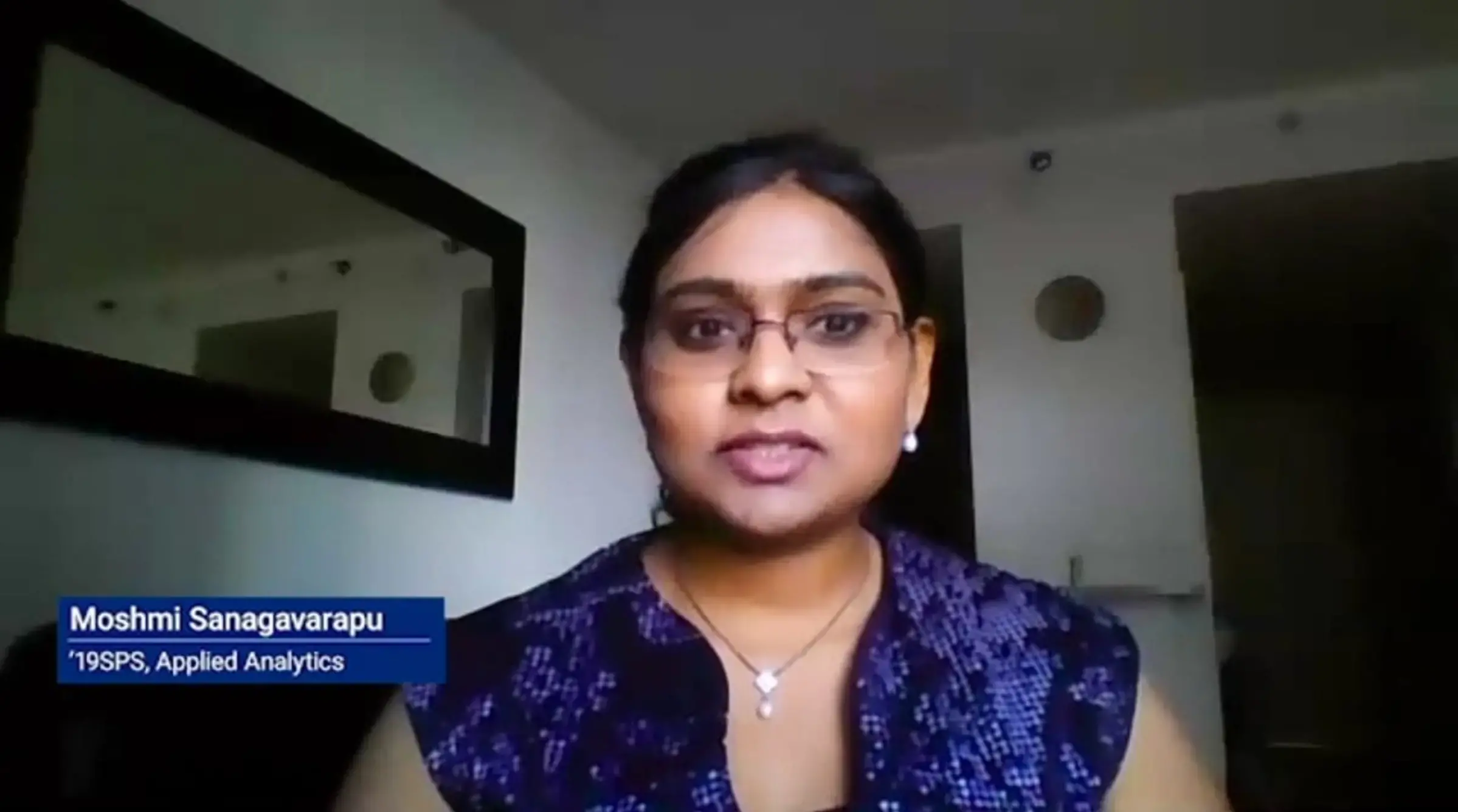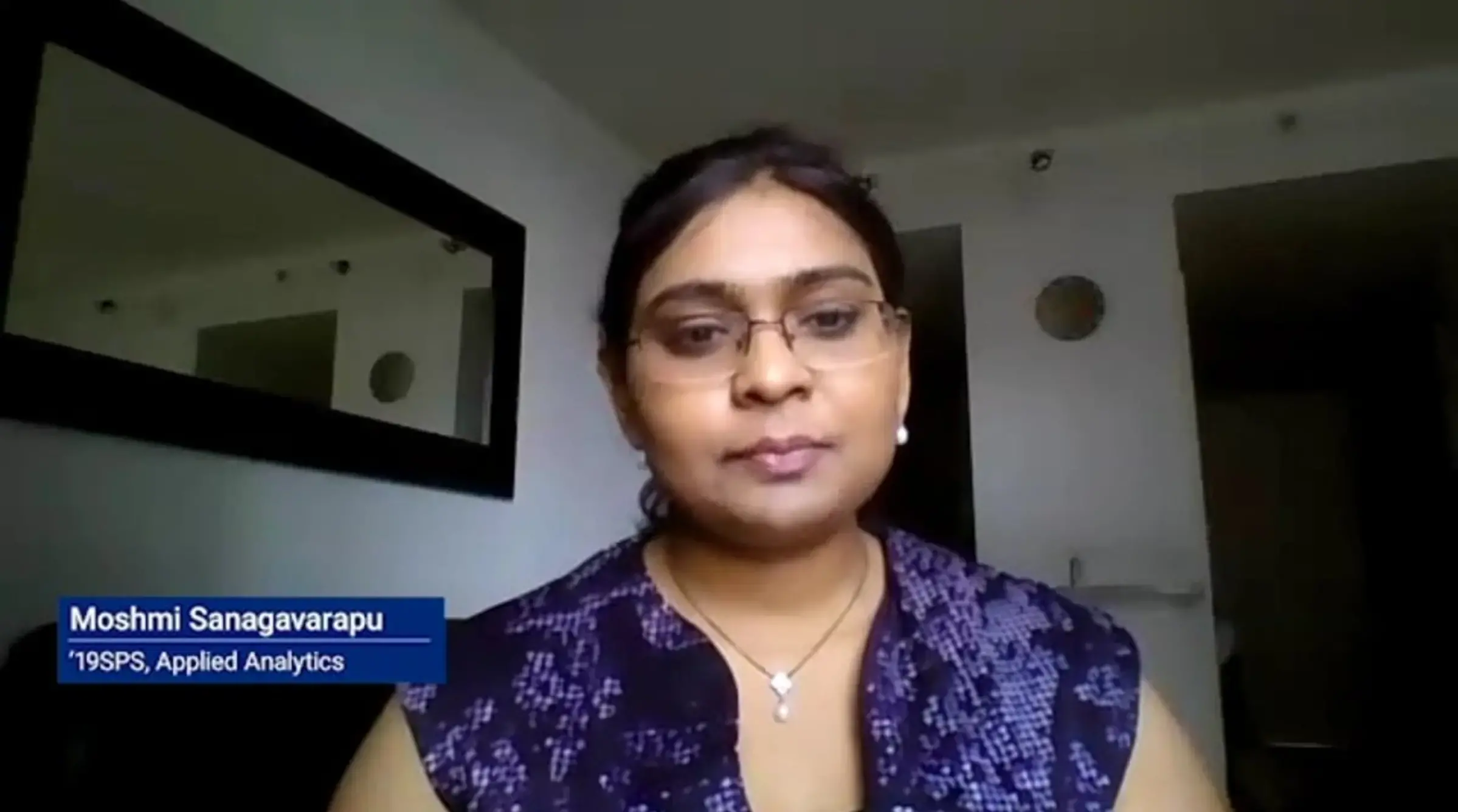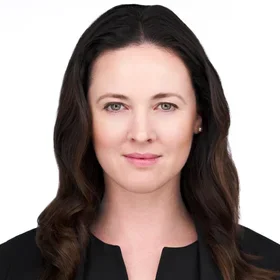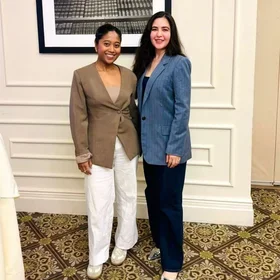When Moshmi Sanagavarapu enrolled in Columbia’s Applied Analytics M.S. program, she already had more than seven years of experience using analytics to optimize processes to help top firms reach their goals. But she wanted to bring her talents to the U.S. jobs market. “Even though I’ve had a lot of experiences in the past in different countries,” she said, she knew it would be critical “to understand what this entire process would be from the standpoint of American companies.”
By mapping out and starting her job search strategy early on at Columbia University, Moshmi says she was able to find a good job that aligned with her goals. A key part of her success, she says, was proactively seeking all the resources she had access to as a Columbia student. That included consulting with the career experts at SPS’s Career Design Lab and her professors, early and regularly—plus a lot of persistence.
This summer, SPS is offering a new course designed for incoming master’s students preparing to engage with top companies that are recruiting this fall. The U.S. Career & Communication Accelerator is a four-week online course that provides international students with hands-on practice, real-world application, and a competitive edge to help them tackle the U.S. job market confidently and competently.
Today, Moshmi is an Associate Director of Analytics at media firm Group M - EightBar. She shared insights from her own job preparation process as well as advice for current international students seeking employment in the U.S.
What was the biggest surprise to you when you embarked on your job search as an SPS student?
Searching for the right job is just not easy. There are so many factors that go into it—project requirements, related proficiencies, culture fit, location, etc. As students, we must be mindful of these as we enter the job market in the U.S. Our affiliation with Columbia University can lead us to the gate, which is well guarded by HR professionals. But after that point, it is truly your own acquired skills and capabilities which will eventually get you through the hiring door. The journey from the gate to the door is simply filled with competition; we are competing not only with our fellow Columbia graduates but students from other universities as well. Hence it is very important to determine your unique selling points early on and highlight them during the interview process.
Which resources did you use in your job preparation process?
Over the course of preparing myself for this job search process, I used all of the resources that Columbia University had to offer—from the libraries to the student body leadership with ISAC (Indian Students Association at Columbia) to learning and coaching with our esteemed professors to going to the Career Design Lab to really understand what this entire process would be from the standpoint of American companies. Even though I’ve worked across global teams in the past, it was important to really understand what was needed in the U.S. professional market and how to play the game well.
What lesson do you wish you had learned or skills you had developed before you started interviewing with American firms?
I learned to become a good listener. During interviews, people are typically nervous and are constantly trying to anticipate the interviewer’s next question. And that leads us to getting confused and not thinking clearly. Instead, learning to stay in the moment, listen to their questions, and provide thoughtful responses is a great way to drive your interview conversation ahead. This also helps you to keep your interviewer engaged and interested in your thoughts and ideas. It also helps to demonstrate your strengths and expertise in your field.
What advice do you have for international students as they embark on their professional education in the U.S.?
My main advice is do not give up easily. I must have applied to 400+ jobs via LinkedIn and all possible job portals out there before I landed my role at Group M - EightBar as a Senior Analyst. I have attended multiple final interviews and landed a few job offers as well. However, some uncontrollable factors did not allow things to materialize. Plus, visa sponsorship added another layer of complexity to the whole job search process. Two years later, I’m an Associate Director in the same analytics team that I had started off with and I now manage a large team! When I look back, I understand that I continued to persevere with determination and simply refused to give up!
Stay confident and continue to learn. You need to be on a self-learning path always, and build your knowledge and expertise in your field of work. This could be through academic research projects, internships/ externships, online boot camps, etc. Just sending out job applications may not be enough. Having varied project experiences and capturing them well with a good resume is required to get you through that HR gate and eventually lead you to the door of the hiring manager. During the interviews, you need to demonstrate your confidence and the capabilities that you’ve developed as a result of your hard work and dedication.
Believe in yourself at all times, regardless of the ups and downs, delays, waiting periods, and no replies or rejection emails in the job search. I’ve faced them all! Continue to believe in your efforts and your goals. Eventually, it is going to be your self-belief that will translate into the required confidence during your interviews. Both the HR professionals and hiring managers will see this through and assess you accordingly.
What makes Columbia Applied Analytics graduates stand out in the job market?
As a hiring manager today, it is important for me to have an unbiased viewpoint of all candidate profiles. I have sifted through multiple applications of people with similar backgrounds and good work experiences. What differentiates Columbia’s Applied Analytics graduates from the candidate pool was the strong learning curve they brought to the table.
Being an Applied Analytics graduate myself, I can certainly vouch for the rigor of our coursework and co-curricular activities; they groom us to gracefully handle pressure, develop necessary problem-solving skills, and learn quickly to deliver good results. This unique and essential trait definitely sets us apart and paves the way to long-term career success.
When should students start their job preparation process?
Understanding how to pace the entire preparation and interview journey is very important for students. Once you get the acceptance letter, you should really focus on coming to the university and understanding all of the resources that the university has to offer. Before sending out those job applications, it is important to take a step back to prepare yourself for what is needed in the kinds of jobs that you want to pursue. I would highly advise incoming students to survey the interview landscape with the Career Design Lab. Get to know fellow students and spark peer-to-peer connections.
The next step is to start understanding the job market and building the first thing that you need: a good resume. Learn how to ensure your ongoing curriculum is getting captured correctly in your resume. Get associated with your CDL coach or your peers to have the extra eyes to look at your resume; it’s needed! It’s always good to get extra feedback because that helps you to figure out where you need to polish further.
But again–don’t overdo it; you need to have a steady pace and a good plan of action. For example, how many job applications should I focus on every week along with my coursework? When I was a student, I took the time to attend informational interviews and other campus events to build my knowledge—those are really needed. Attend these sessions so you can talk to professionals in your field to learn how they achieved success and gain them as contacts. Follow up with them. All of that takes time and you just have 24 hours each day so you have to maintain your pace throughout your entire time as a Columbia student. Ramp up your pace as you progress in your coursework and by the last semester, just go all out with job applications and interviews. By then, you would have studied, learned the skills, and groomed yourself. It’s also important to get into the game of interviewing. The more practice you get—even for interviews where you’re not keen on the job itself—the better you will get. Practice makes a man perfect; the more we practice, the more prepared we become. It helps us to eventually stay confident and gracefully nail the interview process.




